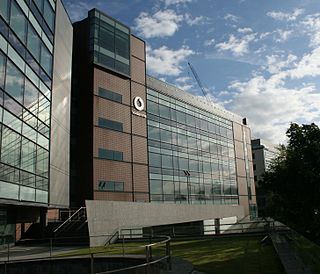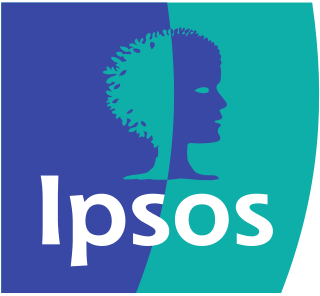Related Research Articles

Telefonaktiebolaget LM Ericsson, commonly known as Ericsson, is a Swedish multinational networking and telecommunications company headquartered in Stockholm. The company sells infrastructure, software, and services in information and communications technology for telecommunications service providers and enterprises, including, among others, 3G, 4G, and 5G equipment, and Internet Protocol (IP) and optical transport systems. The company employs around 100,000 people and operates in more than 180 countries. Ericsson has over 57,000 granted patents.
Telecommunications in the United Kingdom have evolved from the early days of the telegraph to modern broadband and mobile phone networks with Internet services.

T-Mobile is the brand name used by some of the mobile communications subsidiaries of the German telecommunications company Deutsche Telekom AG in the Czech Republic, Poland and the United States.

Deutsche Telekom AG is a German telecommunications company headquartered in Bonn and is the largest telecommunications provider in Europe by revenue. It was formed in 1995 when Deutsche Bundespost, a state monopoly at the time, was privatized. Since then, Deutsche Telekom has consistently featured among FortuneMagazine's top Global 500 companies by revenue, with its ranking as of 2023 at number 79. In 2023, the company was ranked 41st in the Forbes Global 2000. The company operates several subsidiaries worldwide, including the mobile communications brand T-Mobile. It is the world's fifth-largest telecommunications company by revenue.
Ipsos Reid was the name of a Canada-based research company, still existing under the name Ipsos as the Canadian arm of the global Ipsos Group. Founded in Winnipeg in 1979 as the Angus Reid Group, the company expanded across the country and was purchased by the Ipsos Group and given the name Ipsos Reid in 2000.

Vodafone Ireland Limited, a wholly owned subsidiary of the Vodafone Group, is a mobile phone network and broadband provider in Ireland. It was created when the Vodafone Group bought Eircell, the mobile arm of Telecom Éireann. As of September 2019, Vodafone has 26% of broadband subscribers, and 43% of mobile phone subscribers.

The history of mobile phones covers mobile communication devices that connect wirelessly to the public switched telephone network.
First Direct is a telephone and internet based retail bank division of HSBC UK Bank plc based in the United Kingdom. First Direct has headquarters in Leeds, England, and has 1.45 million customers. It was awarded Most Trusted Financial Provider by Moneywise in 2019, and was ranked top in the February 2020 Competition and Markets Authority bi-annual survey for overall service quality.

Ipsos Group S.A. is a multinational market research and consulting firm with headquarters in Paris, France. The company was founded in 1975 by Didier Truchot, Chairman of the company, and has been publicly traded on the Paris Stock Exchange since 1 July 1999.
ICM Research is a public opinion research company that was founded in 1989. ICM is a subsidiary of Creston Insight, a marketing services company, and is a member of the British Polling Council under its new name Walnut Unlimited.
The British Polling Council (BPC) is an association of market research companies whose opinion polls are regularly published or broadcast in media in the United Kingdom. The current President is Jane Green.
Mark Abrams was a British social scientist and market research expert who pioneered new techniques in statistical surveying and opinion polling.

Ben Page is a market researcher and chief executive officer of Ipsos. He has worked there since 1987, having graduated from St. John's College, Oxford the previous year.

In the run up to the general election on 7 May 2015, various organisations carried out opinion polling to gauge voting intention. Results of such polls are displayed in this article. Most of the polling companies listed are members of the British Polling Council (BPC) and abide by its disclosure rules.
EE is a British national mobile network operator and internet service provider, which is a brand within the BT Group. EE is the second-largest mobile network operator in the United Kingdom, with 21.2 million customers as of September 2022.
Survation is a polling and market research agency based in London, England. Survation have been conducting research surveys since 2010. Surveys are conducted via telephone, online panel and face to face as well as omnibus research for a broad range of clients including television, newspapers, charities, lobby groups, trade unions, law firms and political parties. Damian Lyons Lowe is the company founder and Chief Executive.
In the run up to the general election of 2001, several polling organisations carried out opinion polling in regards to voting intention in Great Britain. Results of such polls are displayed below.
This page lists the public opinion polls that were conducted in relation to the 2014 Scottish independence referendum, that was held on 18 September 2014. Overall, polls showed that support for a "No" vote was dominant until the end of August 2014, when support for a "Yes" vote gained momentum and the gap closed significantly, with at least one poll placing the "Yes" vote ahead. In the final week of the campaign, polls showed the "No" vote to be consistently but somewhat narrowly ahead. There were no exit polls although a YouGov post-election poll was published shortly after the polls closed. For the history of the campaign itself see 2014 Scottish independence referendum, Yes Scotland, and Better Together (campaign).
In the run-up to the general election on 8 June 2017, various organisations carried out opinion polling to gauge voting intentions. Results of such polls are displayed in this article. Most of the polling companies listed are members of the British Polling Council (BPC) and abide by its disclosure rules.

The referendum on EU membership took place on 23 June 2016. Opinion polling for the United Kingdom European Union membership referendum was ongoing in the months between the announcement of a referendum and the referendum polling day. Polls on the general principle of the UK's membership of the European Union were carried out for a number of years prior to the referendum. Opinion polls of voters in general tended to show roughly equal proportions in favour of remaining and leaving. Polls of business leaders, scientists, and lawyers showed majorities in favour of remaining. Among non-British citizens in other EU member states, polling suggested that a majority were in favour of the UK remaining in the EU in principle, but that a similarly sized majority believed that if the UK were only able to remain in the EU on renegotiated terms then it should leave.
References
- ↑ "Ipsos website". Ipsos.com. Retrieved 19 April 2022.
- ↑ "Ipsos buys Mori in £88m deal". Research. 10 October 2005. Retrieved 20 December 2012.
- ↑ "Officers / Members - British Polling Council". www.britishpollingcouncil.org. Retrieved 6 February 2019.
- ↑ "Ipsos MORI - Market Research Agencies - The Research Buyers Guide". Market Research Society. Retrieved 6 February 2019.
- ↑ "Cataloguing Update: The Mark Abrams Papers – Churchill College". www.chu.cam.ac.uk. 30 August 2017. Archived from the original on 26 December 2021. Retrieved 19 June 2020.
- ↑ "Reference document – Ipsos 2018" (PDF). Ipsos . Archived (PDF) from the original on 21 June 2020.
- ↑ Rupert Jones (15 June 2005). "Sir Bob quits Mori chairmanship". The Guardian. Retrieved 20 December 2012.
- ↑ Julia Day (10 October 2005). "French rival snaps up Mori". The Guardian. Retrieved 20 December 2012.
- ↑ "Ipsos rebrands in the UK". www.ipsos.com. 1 February 2022. Retrieved 9 March 2023.
- ↑ "Ipsos MORI – IQCS". 5 August 2019.
- ↑ "Approached by us: Telephone | Ipsos MORI". www.ipsos.com. Archived from the original on 21 June 2020. Retrieved 19 June 2020.
- ↑ Kerbaj, Richard; Ungoed-Thomas, Jon (12 May 2013). "Switch on and you become a goldmine". The Sunday Times. Archived from the original on 21 October 2013. Retrieved 11 August 2013.
- ↑ Kerbaj, Richard; Ungoed-Thomas, Jon (12 May 2013). "Secrets of 27m mobile phones offered to police". The Sunday Times. Archived from the original on 30 October 2013. Retrieved 11 August 2013.
- ↑ Pete Swabey (13 May 2013). "EE and Ipsos MORI face privacy backlash over mobile data analysis". Information Age. Retrieved 11 August 2013.
- ↑ "Ipsos MORI response to the Sunday Times". Ipsos MORI. 12 May 2013. Retrieved 11 August 2013.